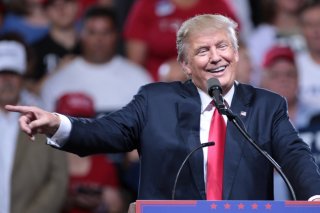Will Trump's New Stance Scare Off More GOP Voters?
Republican leaders are understandably desperate.
The contours of Donald J. Trump’s plan for victory in November came into sharper focus this week when he blasted Bernie Sanders for endorsing Hillary Clinton. In a series of jabs on Twitter, Trump ridiculed Sanders and appealed to his supporters to jump aboard the Trump Train. “To all Bernie voters who want to stop bad trade deals & global special interests,” Trump tweeted, “we welcome you with open arms. People first.”
The real estate mogul also scorned Sanders’ alleged hypocrisy (“Bernie Sanders endorsing Crooked Hillary Clinton is like Occupy Wall Street endorsing Goldman Sachs”) and accused the Vermont senator of abandoning “his supporters by endorsing pro-war pro-TPP pro-Wall Street Crooked Hillary Clinton.”
This is how Trump wins, or at least, how he thinks he will. By blasting Clinton’s wars, he appeals to the majority of Americans who remain skeptical of Clinton’s brand of liberal interventionism. By questioning her support for the TPP (which she has since recanted), Trump is reaching out to those Americans who fear the effects of global trade. And by highlighting Clinton’s alleged close ties to Wall Street, Trump hopes to win over some of the millions of voters who are still angry about the bailouts and sweetheart deals that Washington handed out after the 2008 financial crisis.
No wonder GOP leaders and pundits have been looking for an alternative. Their desperation is palpable and understandable. Trump’s embrace of these three core themes—antiwar, antitrade and anti-Wall Street—in his general election campaign threatens to split the disparate elements of the GOP coalition, perhaps permanently.
At least a few knowledgeable observers doubt that that would be such a bad thing. In remarks at the National Press Club on July 7, former Massachusetts Governor William Weld noted that the Republican Party has broken apart twice before, and managed to emerge in a stronger position both times. Former President Theodore Roosevelt ran on the Bull Moose ticket against sitting President William Howard Taft in 1912, and nearly prevailed. Eight years later, the GOP won the presidency in a landslide.
Weld explained:
“In the mid-1850s, the southern faction of the Whig Party split off to become the Know-Nothing Party, driven by three things: anti-immigrant fervor, violent rallies, and conspiracy theories.
Sound familiar?
The know-nothings disappeared. . . but the other half of the Whig Party, rebranded as the Republican Party, went on to elect Abraham Lincoln President of the United States in 1860.”
Weld, the former Republican, is now running on the Libertarian Party ticket with Gary Johnson, another former Republican governor. In his remarks, Weld focused his fire on Donald Trump, but he mostly urged voters to reject the angry tone of the campaign, which Trump has done so much to stir up.
At least one other Republican governor is also looking past Trump. Ohio Governor John Kasich won’t even be attending the convention next week in Cleveland, but that doesn’t mean that he’s stopped thinking about national office.
I sketched out the direction that Kasich, and the GOP, should adopt here, drawing on something that I had first written in 2008. To oversimplify, the GOP can choose one of three paths:
1. Isolationism: today exemplified by Trump's xenophobia, nativism and protectionism, combined with a skepticism of nation-building wars, but not wars, per se.
2. The status quo pre-Trump: episodic support for global trade and immigration (though often pandering to the xenophobes), and the hawkish foreign policy promoted by the editors at the Weekly Standard and the Wall Street Journal.
3. Global engagement and military restraint: This would embrace international trade, expand opportunities for immigrants to come here legally, and avoid foreign wars when U.S. vital interests are not at stake.
I favor the third option. Weekly Standard editor (and outspoken Trump foe) Bill Kristol number two, and the Trumpkins number one.
I'm curious to know where John Kasich is likely to land if, as the Washington Post story suggests, he is positioning himself for another presidential run in 2020. Or might someone else come along, and pick up the pieces of the GOP left behind after the Trump wrecking ball?
There is strong public support for restraint, and that is only likely to grow as the millennial generation, already the largest age cohort, displaces older Americans in the voting booth. Millennials are generally skeptical of foreign wars, but supportive of immigration and not hostile toward global trade. A smart candidate would at least consider that approach to the world.
But Donald Trump has apparently made up his mind.
Christopher A. Preble is vice president for defense and foreign policy studies at the Cato Institute.
Image: Trump at a rally. Gage Skidmore/Flickr.

